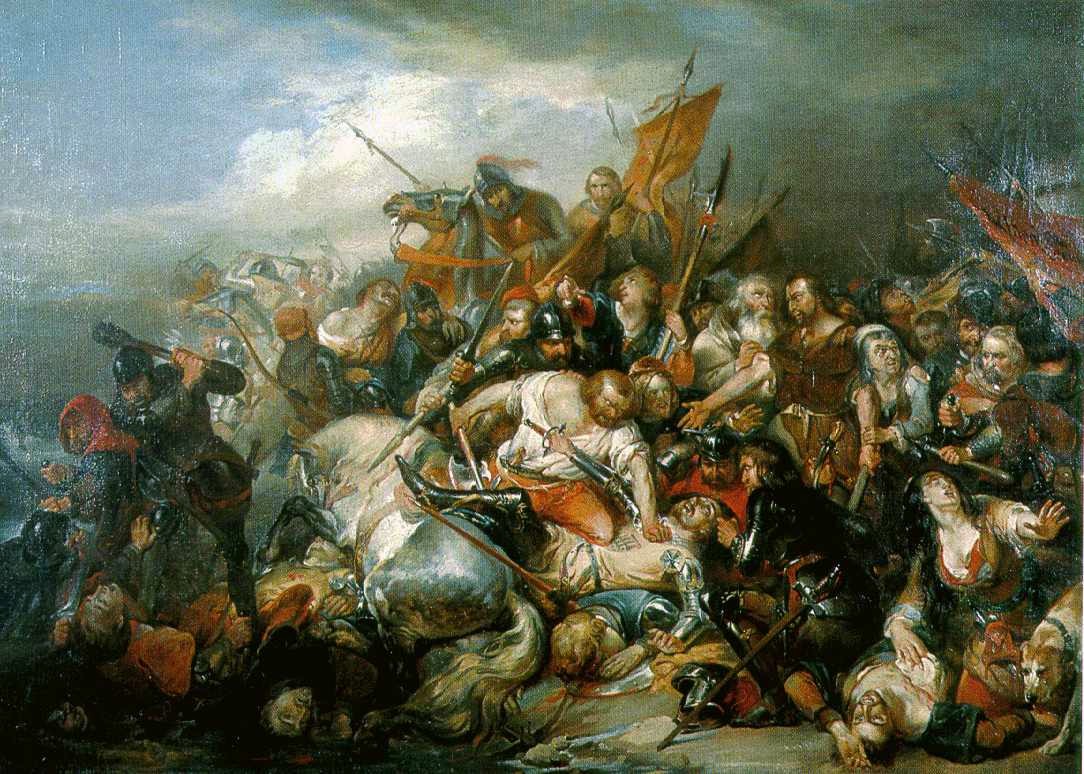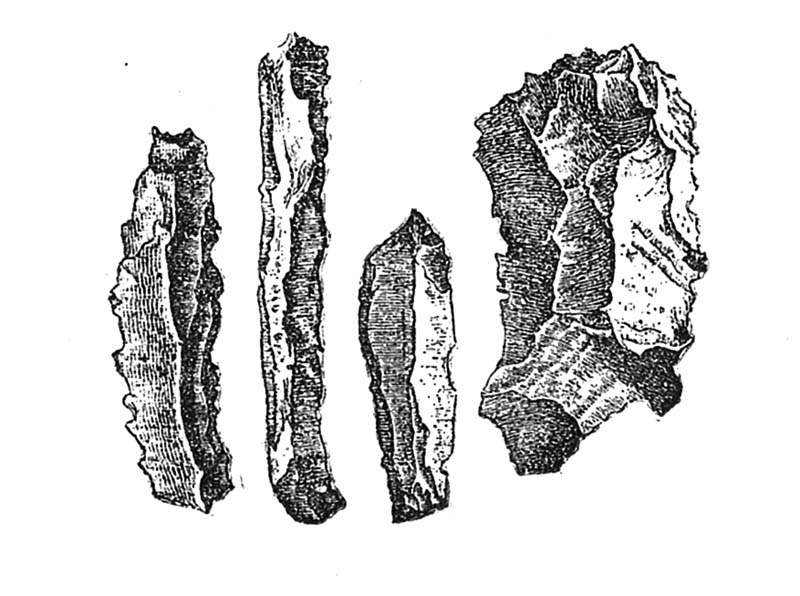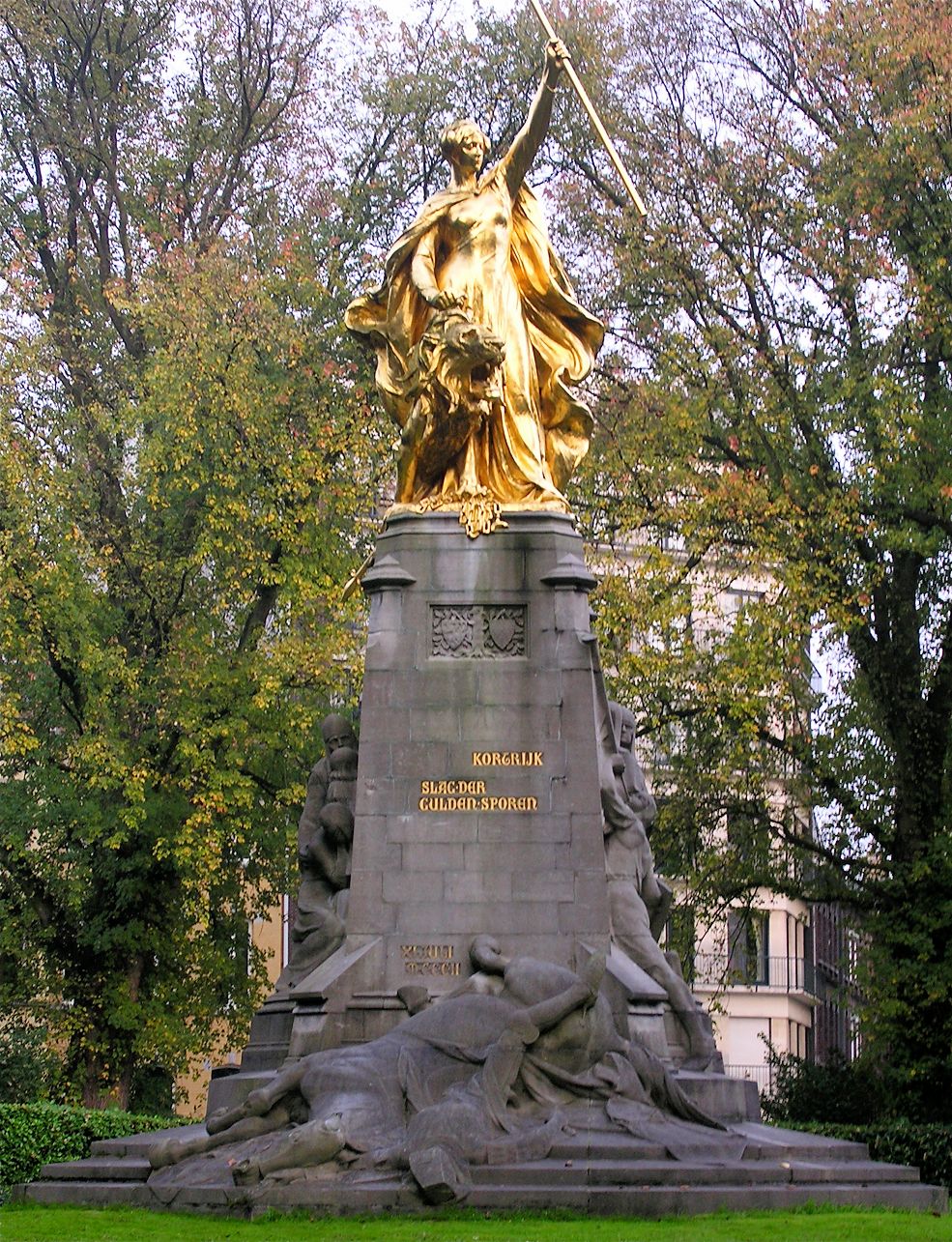|
Day Of The Flemish Community
The Flemish Community Day () is an annual holiday held in the Flemish Community of Belgium on 11 July. It is also variously translated as the Day of the Flemish Community, Flemish Community Holiday, Feast Day of the Flemish Community, Festival of the Flemish Community, or other variants. This date was chosen by the Flemish Community of Belgium to mark the anniversary of the Battle of the Golden Spurs () in 1302. History In 1302, the French king Philip IV sent an army to punish the Flemish citizens of Bruges, who earlier that year rebelled against the king and attacked the French governor of Flanders (the so-called Good Friday of Bruges). The French army was composed of about 2,500 knights and squires, supported by about 5,500 infantry. The Flemish, in contrast, fielded a town militia force of 9,000 consisting mostly of infantrymen. The two forces clashed on 11 July in an open field outside the Flemish city of Kortrijk and the battle ended with the overwhelming victory of the ... [...More Info...] [...Related Items...] OR: [Wikipedia] [Google] [Baidu] |
Flemish Community
The Flemish Community (, ) is one of the three institutional communities of Belgium, established by the Belgian constitution and having legal responsibilities only within the precise geographical boundaries of the Dutch-language area and of the bilingual area of Brussels-Capital. Unlike in the French Community of Belgium,The parliament of the French Community is distinct from the Walloon Parliament; this is more obvious for the parliament of the German-speaking Community because its much smaller territory is within the latter region. the competences of the Flemish Community have been unified with those of the Flemish Region and are exercised by one directly elected Flemish Parliament based in Brussels. History State reforms in Belgium turned the country from a unitary state into a federal one. Cultural communities were the first type of decentralisation in 1970, forming the Dutch, French and German Cultural Community. Later on, in 1980, these became responsible for more cu ... [...More Info...] [...Related Items...] OR: [Wikipedia] [Google] [Baidu] |
Hendrik Conscience
Henri (Hendrik) Conscience (3 December 1812 – 10 September 1883) was a Belgian author. He is considered the pioneer of Dutch-language literature in Flanders, writing at a time when Belgium was dominated by the French language among the upper classes, in literature and government. Conscience fought as a Belgian revolutionary in 1830 and was a notable writer in the Romanticist style popular in the early 19th century. He is best known for his romantic nationalist novel, '' The Lion of Flanders'' (1838), inspired by the victory of a Flemish peasant militia over French knights at the 1302 Battle of the Golden Spurs during the Franco-Flemish War. Over the course of his career, he published over 100 novels and novellas and achieved considerable popularity. After his death, with the decline of romanticism, his works became less fashionable but are still considered as classics of Flemish literature. Early life Childhood Hendrik was the son of a Frenchman, Pierre Conscience, from Bes ... [...More Info...] [...Related Items...] OR: [Wikipedia] [Google] [Baidu] |
Public Holidays In Belgium
In Belgium, there are ten official public holidays. Other particular days are also celebrated, but these are not official public holidays and employers are not obliged to give their employees a day off. However, some employers do award a day's holiday in accordance with union. Public holidays In addition to the above, the same legal text names all Sundays as public holidays (which is why Easter and Pentecost, which always fall on Sundays, are "feasted" by extending the Sunday holiday to the following Monday). Particular days celebrated in Belgium that are not official public holidays The days of the three communities are holidays for their civil servants and for employees of institutions controlled, supervised or financed by them (e.g. municipalities, universities) and may also be observed by banks in the community concerned. King's Feast is a holiday observed by all (i.e. federal, community or regional, provincial and local) administrations, including some of the schools th ... [...More Info...] [...Related Items...] OR: [Wikipedia] [Google] [Baidu] |
History Of Belgium
For most of its history, what is today Belgium was either a part of a larger territory, such as the medieval Carolingian Empire, or was divided into a number of smaller states which were prominent among them. The pre Belgian states being, the Duchy of Lower Lorraine, the Duchy of Brabant, the County of Flanders, the Prince-Bishopric of Liège, the County of Namur, the County of Hainaut and the County of Luxembourg. Due to its strategic location as a country in contact between different cultures, Belgium has historically been called the "crossroads of Europe", and for the many armies fighting on its soil, it has also been called the "battlefield of Europe" or the " cockpit of Europe". Today, Belgium's modern shape can be traced back at least as far as the southern core of the medieval Burgundian Netherlands. The Eighty Years' War (1568–1648) later led to the split between a northern Dutch Republic and the Southern Netherlands from which Belgium and Luxembourg developed. The ar ... [...More Info...] [...Related Items...] OR: [Wikipedia] [Google] [Baidu] |
Franco-Flemish War
The Franco-Flemish War>(; ) was a conflict between the Kingdom of France and the County of Flanders between 1297 and 1305. The war should be seen as related to the original Gascon War and the First War of Scottish Independence, as Philip IV of France and Edward I of England sought allies in Scotland and Flanders respectively and thus involved the related conflicts. Background Philip IV of France, PhilipIV, who became king of France, king of Kingdom of France, France in 1285, was determined to strengthen the French monarchy at any cost. The County of Flanders had been nominally part of the kingdom since the Treaty of Verdun in 843 but had maintained its independence from the crown. Flanders had some of the richest cities of that time, including Bruges, Ghent, Ypres, Lille and Douai. They tried to keep their independence from the Count of Flanders and from the rural aristocracy but were themselves divided between their rich patrician (post-Roman Europe), patricians and the urban ... [...More Info...] [...Related Items...] OR: [Wikipedia] [Google] [Baidu] |
Flemish Government
The Flemish Government ( ) is the executive branch of the Flemish Community and the Flemish Region of Belgium. It consists of a government cabinet, headed by the Minister-President of Flanders, Minister-President and accountable to the Flemish Parliament, and the public administration (civil service) divided into 13 policy areas, each with an executive department and multiple agencies. The Flemish Government cabinet consists of up to a maximum of eleven ministers, chosen by the Flemish Parliament. At least one minister must come from Brussels. The ministers are drawn from the political parties which, in practice, form the Coalition government, governing coalition. The Government is chaired by the Minister-President of Flanders, Flemish Minister-President. Ministers head executive departments of the government administration. Ministers must defend their policies and performance in person before the Flemish Parliament. The Flemish Government must receive and keep the confidence of th ... [...More Info...] [...Related Items...] OR: [Wikipedia] [Google] [Baidu] |
Communities, Regions And Language Areas Of Belgium
Belgium is a federation, federal state comprising three communities and three regions that are based on four language areas. For each of these subdivision types, the subdivisions together make up the entire country; in other words, the types overlap. The language areas were established by the History of Belgium#The rise of the federal state, Second Gilson Act, which entered into force on 2 August 1963. The division into language areas was included in the Constitution of Belgium, Belgian Constitution in 1970. Through state reform in Belgium, constitutional reforms in the 1970s and 1980s, regionalism (politics), regionalisation of the unitary state led to a three-tiered federation: federalism, federal, regional, and community governments were created, a compromise designed to minimize linguistic, cultural, social, and economic tensions. Schematic overview This is a schematic overview of the basic federal structure of Belgium as defined by Title I of the Belgian Constitution. Ea ... [...More Info...] [...Related Items...] OR: [Wikipedia] [Google] [Baidu] |
De Leeuw Van Vlaanderen (book)
''The Lion of Flanders, or the Battle of the Golden Spurs'' () is a major novel first published in 1838 by the Belgian writer Hendrik Conscience (1812–1883)—an early example of historical fiction. The book focuses on the medieval Franco-Flemish War and the Battle of the Golden Spurs of 1302 in particular. It is written in Conscience's typical stylistic romanticism and has been described as the "Flemish national epic". It was unusual for ''The Lion of Flanders'' to be written in Dutch. Considered as one of the founding texts of Flemish literature, it became a significant work for the emerging Flemish Movement, reviving popular interest in the Battle of the Golden Spurs and Flemish medieval history as part of a modern political agenda. Despite its importance, the work has become little-read in modern times. Nonetheless, it has been the subject of various adaptations in the form of cartoons, television series, and film. Background Hendrik Conscience was born into a mixed Fre ... [...More Info...] [...Related Items...] OR: [Wikipedia] [Google] [Baidu] |
Robert II Of Artois
Robert II (September 1250 – 11 July 1302) was the Count of Artois, the posthumous son and heir of Robert I and Matilda of Brabant. He was a nephew of two kings; Louis IX of France and Charles I of Sicily. A capable military commander and administrator, Robert was involved in a number of conflicts involving the French Capetian dynasty, including the War of the Sicilian Vespers and the Franco-Flemish War. He died during the latter conflict while leading a French army at the Battle of the Golden Spurs. Life A close confidant of the Capetian royal family and experienced soldier, Robert served as a military commander and administrator under the rule of uncle, Philip III of France and Philip's son, Philip IV. During the former Philip's early reign, he dispatched Robert and a French army to Iberia to suppress a rebellion in the Kingdom of Navarre. In 1285, he was named as regent of the Angevin Kingdom of Naples while the kingdom was engaged in the War of the Sicilian Vespers ... [...More Info...] [...Related Items...] OR: [Wikipedia] [Google] [Baidu] |
French Community Day
The French Community Day () is an annual holiday held in the French Community of Belgium on 27 September. It is also variously translated as the Day of the French Community, French Community Holiday, Feast Day of the French Community, Festival of the French Community, or other variants. This date was chosen by the French Community of Belgium after an important episode in the Belgian Revolution. Origins The Belgian Revolution from the United Kingdom of the Netherlands erupted on the night of 25 August 1830, following a performance of Daniel Auber's sentimental and patriotic opera ''La Muette de Portici'', a tale suited to fire National Romanticism, for it was set against Masaniello's uprising against the Spanish masters of Naples in the 17th century. The play caused a riot and the crowd poured into the streets after the performance, shouting patriotic slogans, and swiftly took possession of government buildings. The affable and moderate Crown Prince William, who represented the ... [...More Info...] [...Related Items...] OR: [Wikipedia] [Google] [Baidu] |
Kortrijk
Kortrijk ( , ; or ''Kortrik''; ), sometimes known in English as Courtrai or Courtray ( ), is a Belgian City status in Belgium, city and Municipalities in Belgium, municipality in the Flemish Region, Flemish Provinces of Belgium, province of West Flanders. With its 80,000 inhabitants (2024) Kortrijk is the capital and largest city of the judicial and administrative arrondissement of Kortrijk. The wider municipality comprises the city of Courtrai proper and the villages of Aalbeke, Bellegem, Bissegem, Heule, Kooigem, Marke (Belgium), Marke, and Rollegem. Courtrai is also part of the cross-border Lille-Kortrijk-Tournai metropolitan area. The city is on the river Leie, southwest of Ghent and northeast of Lille. Mouscron in Wallonia is just south of Courtrai. Courtrai originated from a Gallo-Roman town, ''Cortoriacum'', at a crossroads near the Leie river and two Roman roads. In the Middle Ages, Courtrai grew significantly thanks to the flax and wool industry with France and En ... [...More Info...] [...Related Items...] OR: [Wikipedia] [Google] [Baidu] |
Bruges
Bruges ( , ; ; ) is the capital and largest city of the province of West Flanders, in the Flemish Region of Belgium. It is in the northwest of the country, and is the sixth most populous city in the country. The area of the whole city amounts to more than 14,099 hectares (140.99 km2; 54.44 sq. miles), including 1,075 hectares off the coast, at Zeebrugge (from , meaning 'Bruges by the Sea'). The historic city center is a prominent World Heritage Site of UNESCO. It is oval and about 430 hectares in size. The city's total population is 117,073 (1 January 2008),Statistics Belgium; ''Population de droit par commune au 1 janvier 2008'' (excel-file) Population of all municipalities in Belgium, as of 1 January 2008. Retrieved on 19 October 2008. of who ... [...More Info...] [...Related Items...] OR: [Wikipedia] [Google] [Baidu] |




